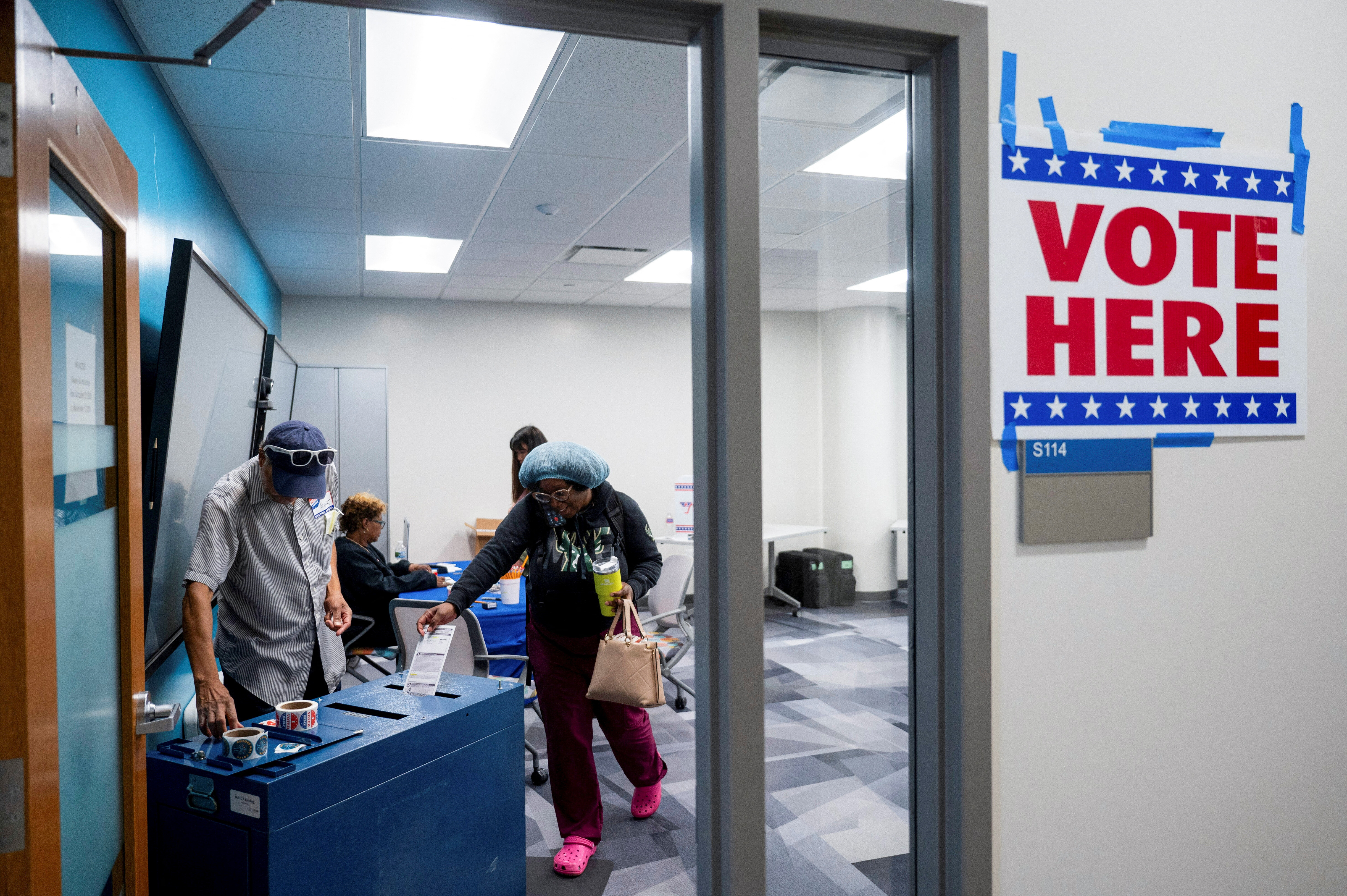3 min read
3-term Democratic lawmaker tries to hold key US Senate seat in GOP-friendly Montana
 Merit Street Media
|
Nov 05, 2024
Merit Street Media
|
Nov 05, 2024

Billings, Mont. — Three-term incumbent Democratic U.S. Sen. Jon Tester of Montana faces perhaps his toughest reelection challenge yet on Tuesday, with control of the Senate on the line in a state that has veered sharply rightward since the 68-year-old grain farmer's first election.
Republicans have pinned their hopes on Tim Sheehy, a former U.S. Navy SEAL and founder of an aerial firefighting company. Sheehy, 38, had early backing from party leaders including former President Donald Trump, clearing the political newcomer's path to win the June primary.
It is the first time Tester is sharing the same ballot as Trump, who twice won in Montana by wide margins.
Long lines were seen at Montana polling places as a winter storm brought snow to some parts of the state.
A Sheehy victory would seal Republican Party dominance across the five-state Northern Plains region: Tester entered office as one of six Democratic senators in the largely rural swath of American heartland that also includes Wyoming, Nebraska, North Dakota and South Dakota. He is now the only one.
The lawmaker also is the sole remaining Democrat to hold statewide office in Montana.
The candidates and their allies shattered political spending records and barraged voters with almost $300 million in ads on TV, radio, their phones and in their mailboxes. Total spending is expected to reach about $500 for each active registered voter in Montana.
“This is the toughest race since Tester got in,” said political analyst Jeremy Johnson, “and Tim Sheehy is a real formidable candidate.”
In the race’s final days, Tester’s campaign plastered Montana newspapers and airwaves with advertisements amplifying claims from a former park ranger that Sheehy lied about a bullet wound in his arm.
Sheehy said during an interview with conservative pundit Megyn Kelly that the wound came from combat in Afghanistan and wasn’t accidentally self-inflicted as he told the ranger in 2015. The Republican said Tester was trying to smear him and other SEALs vouched for Sheehy’s integrity, but he hasn't released any corroborating medical records.
Montana's political profile has shifted dramatically since Tester's first election in 2006. It went from a “purple” state that traditionally sent a mix of Democrats and Republicans to higher offices, to one where partisan divisions rule and the GOP enjoys a supermajority in the state Legislature.
Tester warned throughout the campaign about “outsiders” such as Sheehy — who came to Montana in 2014 and bought a ranch — driving up housing prices and restricting hunting and fishing access for the general public.
“We’re seeing a lot of folks come into our state, rich folk, who want to try to buy our state, to try to change it into something that it’s not,” Tester said.
Tester, the chairman of the Senate Veterans' Affairs Committee, has built a record as a moderate over his 18 years in office. He has delivered legislation such as expanding health care for veterans and bringing broadband to rural areas, while sometimes opposing Democratic proposals to tighten rules for the energy industry.
But Tester also consistently voted with Democrats on major legislation, putting him out of step with Montana's hardening conservatism.
In the small city of Columbus, Montana, John Hungerford, 71, said after casting his ballot for Sheehy that Tester hadn't done enough to address his top issues — immigration and inflation — and too often followed the Democratic party line.
“His voting record is not indicative of the values in Montana,” Hungerford said.
Sheehy sought to dent Tester's reputation for authenticity by highlighting more than $500,000 that lobbyists and their families donated to Tester this election cycle. Republicans alleged a pattern of campaign donations flowing to the Democrat from industries that needed his vote, after the lawmaker faced scrutiny over donations from bank executives affected by a 2018 regulatory roll back and from Lockheed Martin employees who benefited from a 2021 defense bill.
There was no indication of wrongdoing by Tester. But Sheehy's tactic mirrored Tester’s 2006 upset of a three-term Republican incumbent who was ensnared in a lobbying scandal.
Sheehy also linked Tester to the perceived failures of the Biden-Harris administration.
“We’ve got an economy that’s on its knees. We’ve got foreign policy crises all over the world that we can’t even hope to begin to address right now. It’s time for a change in leadership,” Sheehy said.
The Tester campaign's response was to remind voters of his longtime advocacy in Congress for Montana's economically vital agriculture industry.
Tester also paired his campaign with efforts to pass a ballot initiative that would enshrine abortion rights in the state constitution. It was part of an effort to court the independents and moderate Republicans whose support has kept Tester in office even as the state shifted rightward.
Sandra Troy, 68, said abortion was at the top of her mind as she voted for Tester, believing the Democrat would help protect access to the procedure.
“The government shouldn't be bossing into our lives,” she said. “Tester, he votes for the people.”
Sheehy touted his military service and business experience, and drew parallels between his recent arrival in Montana and settlers in the early 1900s who were resented by those who arrived even earlier.
Sheehy pushed past questions raised over his record as a lobbyist and derogatory comments he made to supporters about Native Americans.
His campaign was buoyed over the summer by a rally with Trump in Bozeman, Montana. The fast-growing college city could be crucial in determining which side wins.
Trump — who carries a personal grudge over Tester's 2018 derailing of Trump's veteran affairs nominee — mocked Tester's physical appearance during the event.
Copyright Associated Press

